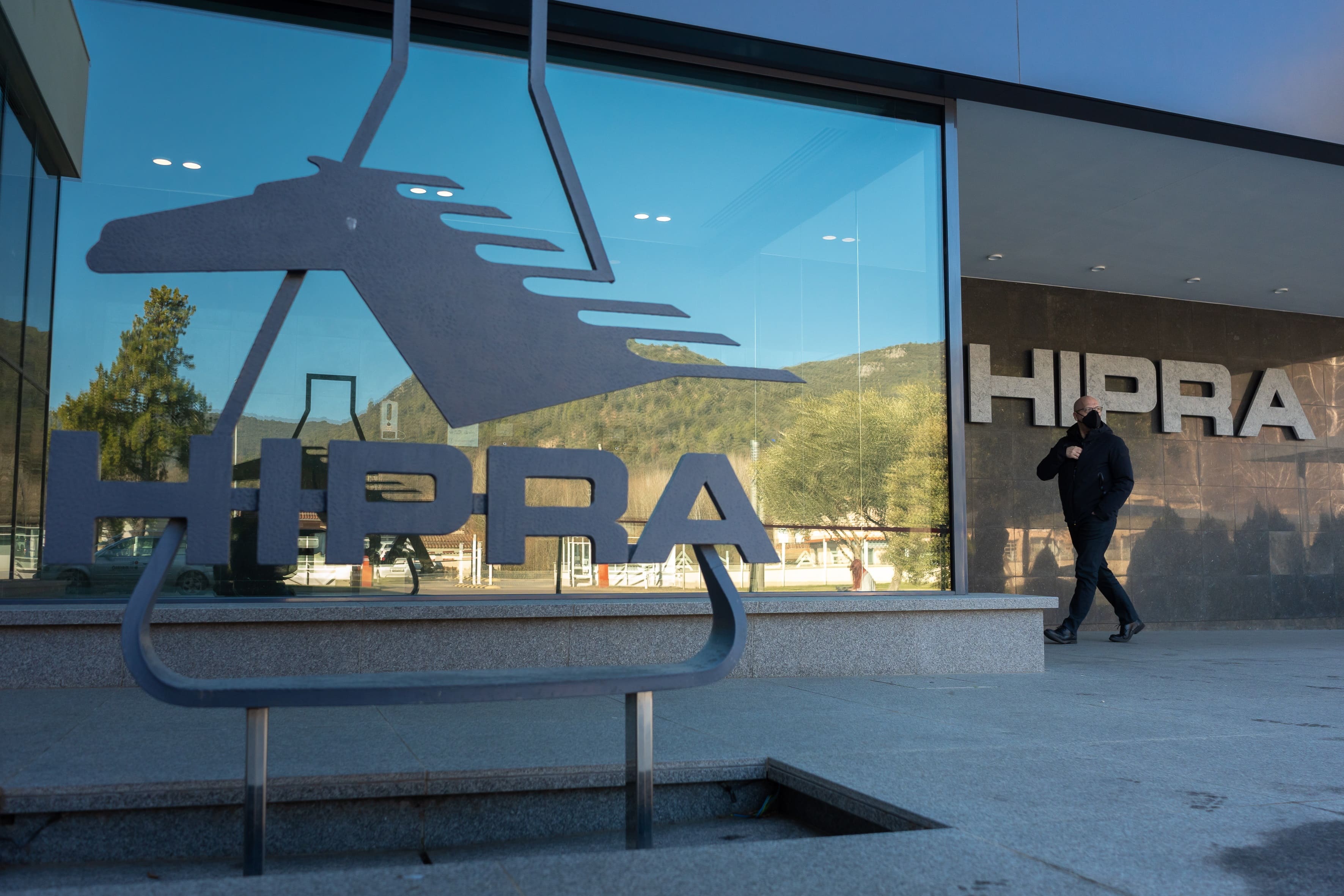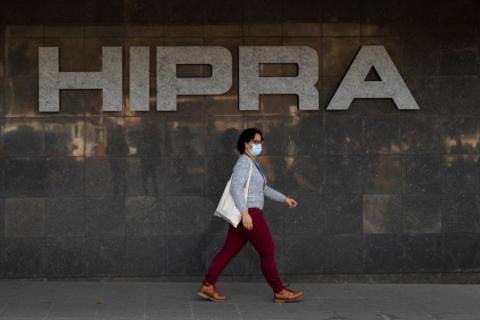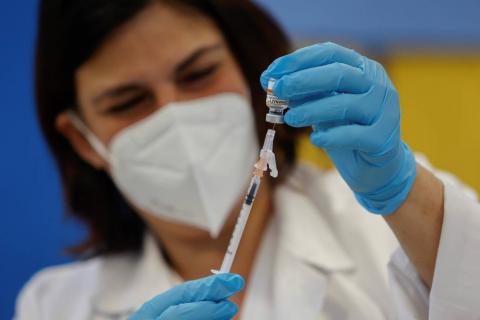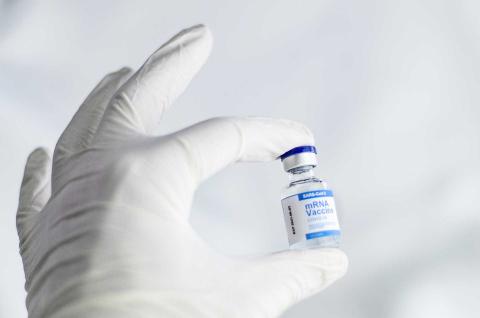Reactions: EMA authorises Hipra's Spanish vaccine against covid-19
The European Medicines Agency (EMA) has licensed Hipra's vaccine - currently called Bimervax - against SARS-CoV-2 as a booster in people aged 16 years and older who have previously been vaccinated with mRNA vaccines. The EMA began the ongoing evaluation of the vaccine, which was expected to be approved in the middle of last year, on 29 March 2022.

EFE/David Borrat.
Rial - hipra EMA EN
José Gómez Rial
Head of the Immunology Department at the Complejo Hospitalario Universitario de Santiago de Compostela (CHUS), Servicio Gallego de Salud (SERGAS)
It is always good news when a new vaccine is approved to add to the existing ones in the fight against covid-19, and even better news if the vaccine is manufactured in Spain, with all that this implies.
It is a vaccine that uses a classic recombinant protein technology (containing the S protein of the original variant and the Beta variant) adjuvanted.
But I am sorry to cool down a bit the expectations that have been raised with Hipra and the minister's statements in this regard. Firstly, it has yet to prove that it is a better vaccine than existing vaccines; there is insufficient evidence to make such a claim. Secondly, Hipra uses a technology (recombinant protein) that does not allow for rapid adaptation to changes in the virus. In this respect, mRNA technology is always more flexible and faster, and this is precisely one of the advantages of mRNA technology over existing technologies.
I am convinced that it will produce very good results. In particular, this vaccine, which uses a different platform, should be indicated for people who have not responded efficiently to the initial regimen with an mRNA vaccine, and thus benefit from the advantages of a heterologous combination, which has proved so successful so far.
Hipra - Margarita del Val
Margarita del Val
Virologist and immunologist at the Severo Ochoa Centre for Molecular Biology, coordinator of the CSIC interdisciplinary research platform on Global Health.
It is a milestone to have the first vaccine authorised for human use derived from research and developed by a Spanish company. Not having any until now was not commensurate with the level and power of the country. The new Bimervax vaccine, from Hipra, is somewhat different and original in its composition compared to all other vaccines against coronavirus that are authorised in the European Union by the European Medicines Agency, eight with this one. At the same time, it uses a classical method of vaccine production, containing virus-like proteins, like two other such vaccines. It is expected to have similar efficacy and safety to the others and, like the others, will be carefully monitored from now on by pharmacovigilance experts.
It is a milestone for the country because, in order to achieve it, all the candidates that have been initiated from Spain have been "walking the road", having to improve, resolve and learn all the procedures involved in research, scale-up, production, clinical trials, drug evaluation, in an environment in which we did not have it all under control or with sufficient experienced personnel and structures.
It has taken longer than other vaccines, but less than many others. It is an investment in the future of the country. We continue to research and develop vaccines because we still need more and better vaccines: for this virus, for other respiratory infections, for other infectious agents, current or future. Vaccines that also protect us from infection and, therefore, allow collective immunity if they prevent those vaccinated from becoming infected; these are the vaccines that best tackle pandemics and allow us to return to normality more quickly.
Vaccines that are more stable, easier to preserve, cheaper. Vaccines that are easier to inoculate, that do not require specialised personnel; vaccines that, because of these advantages, will reach the furthest corners of the planet.
Marcos López Hoyos - hipra luz verde EN
Marcos López Hoyos
Scientific Director of the Valdecilla Health Research Institute (IDIVAL), Head of the Immunology Department, and Professor of Immunology at the University of Cantabria-Marqués de Valdecilla University Hospital
The approval of Hipra's vaccine is excellent news. Firstly, we have a vaccine that will work with a single dose and induce a broader and longer-lasting immune response than previously available vaccines. In addition, this vaccine can be kept refrigerated and does not need to be frozen. Finally, and especially relevant, it means that we now have a Spanish company capable of manufacturing human vaccines for this and other infections in the future.
África González - Hipra luz verde EN
África González-Fernández
Professor of Immunology at the University of Vigo, researcher at CINBIO, and member of the RAFG
It is a source of pride and joy that we have a Spanish vaccine authorised by the European Medicines Agency against covid-19, developed entirely in our country and in just three years.
The Bimervax vaccine uses two recombinant proteins of the alpha and beta variants of SARS-CoV-2 (it is therefore bivalent) and has shown great advantages in clinical trials: very good immune response against the variants of concern declared so far by the World Health Organisation (WHO), a maintained and long-lasting response (at least six months and studies are underway to see if it can be maintained for longer, so that it can be used annually), with greater spectrum of coverage (it includes proteins from two variants) and with fewer side effects than RNA vaccines (less reactogenicity in relation to arm pain, fever, etc. ).
The vaccine employs the well-known technology of using recombinant proteins (similar to other vaccines, such as hepatitis or papillomavirus, for example) and has important logistical and economic advantages: it can be kept stable (2-8°C) without the need for freezing or deep-freezing (unlike RNA vaccines) and is likely to be cheaper than RNA vaccines.
The vaccine is licensed for booster doses for those aged 16 years and older. As the virus is likely to remain with us and we must continue to protect the most vulnerable people, we now have a highly effective vaccine that could be administered annually to this group.
We should be very proud of this development carried out in our country by the company Hipra and my sincere congratulations for the initiative, the personal and collective effort, the investment of millions of dollars and the perseverance, which are the elements that have made this historic milestone possible.



